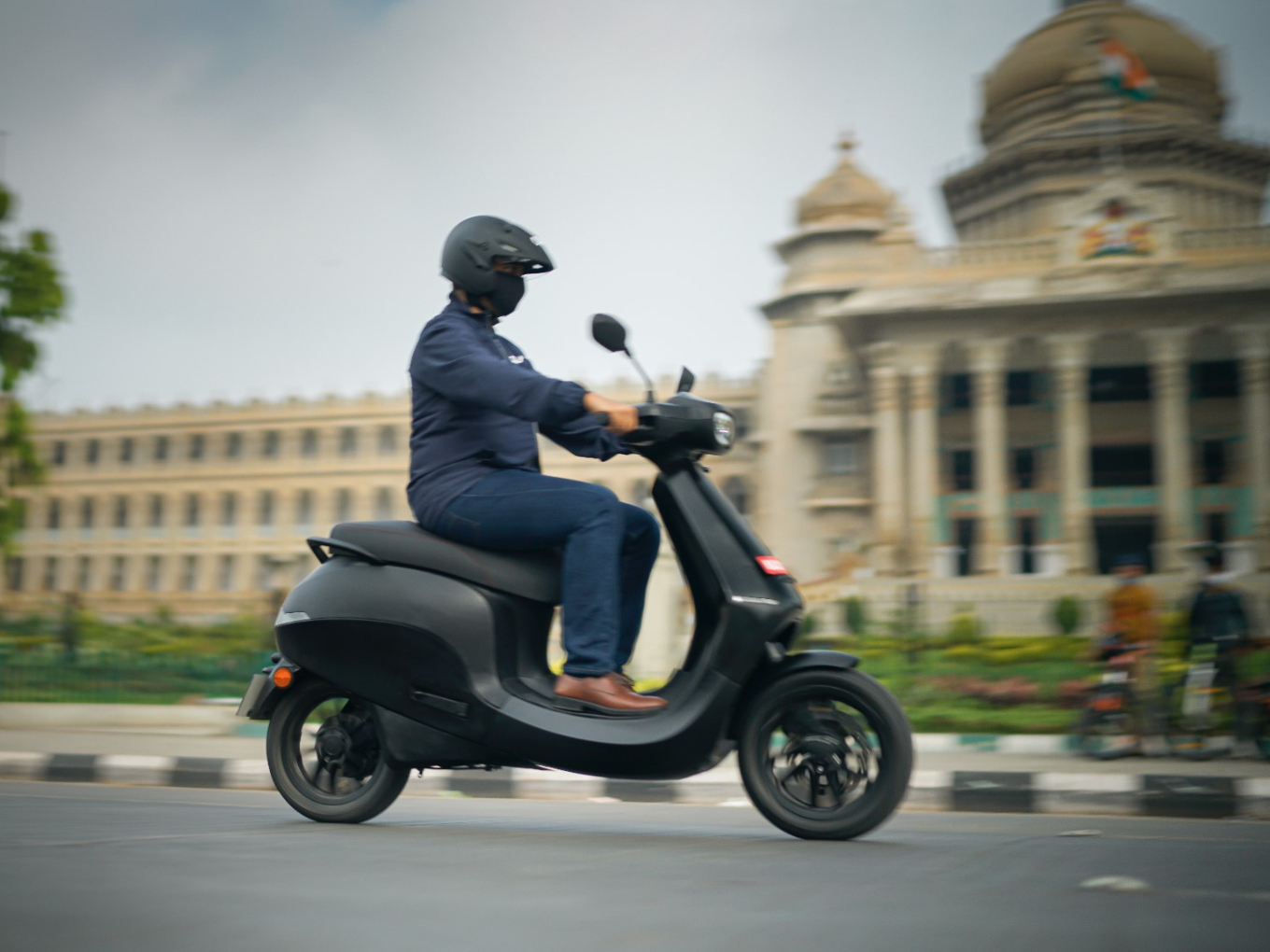
Ride-hailing startup Ola’s new electric scooter claims to have received more than 1 lakh pre-registrations just two days after opening pre-bookings, Ola CEO Bhavish Aggarwal said in a tweet on Jul 17.
Inc42 had reported earlier that Ola is gearing up for a global launch of its electric scooter that is expected to have at least three variants.
Ola Electric’s cheapest scooter variant will be priced below INR 1 lakh, while the highest-priced variant would be available at around INR 1.5 Lakh, a person aware of Ola Electric’s operations told Inc42 on July 8.
The Ola Electric team is working to ensure that pre-orders for the Indian market could be opened from August, while for other Asian and European markets, the process could be started from late September, the source added.
Ola also recently announced the launch of its own manufacturing unit, ‘Future Factory’. Ola’s 500-acre manufacturing unit is currently located in Hosur, Tamil Nadu and the construction is in full swing. However, it isn’t clear whether the unit has already begun production.
Ola will also launch a customised subscription plan for public charging networks named ‘Hypercharger’ which eventually has a target of 100,000 charging points in 400 cities. The Ola ‘Hypercharger’ network will support 50% charge in 18 minutes at the public charging station, Inc42 reported on July 8.
India’s EV revolution is off to an explosive start.
Huge thanks to the 100,000+ revolutionaries who’ve joined us and reserved their scooter. If you haven’t already, #JoinTheRevolution at https://t.co/lzUzbWbFl7 @olaelectric pic.twitter.com/LpGbMJbjxi
— Bhavish Aggarwal (@bhash) July 17, 2021
Interestingly, Ola’s 2W scooters are originally a rebranded version of Netherland-based Etergo scooters. In May 2020, Ola Electric announced that it would start operating as a full-stack manufacturer of electric two-wheelers after acquiring Amsterdam-based Etergo BV.
Etergo had originally branded its 2W vehicle as ‘App Scooters’. The newly rebranded Ola Electric EV, however, does not sport the Etergo or the App Scooter branding in a recent video that was widely publicised by Ola.
The earlier etergo.com website now redirects to an Ola owned website, However, an earlier version of the website taken from the Internet Archive shows that the scooter will have three interchangeable battery modules — each battery has a capacity of 600W per module providing an 80Km range per module. Each module has a battery capacity of 1,155Wh.
Although Ola Electric’s scooter will compete with the petrol vehicle brands such as Honda Activa and others, the Ola EV will in fact directly take on existing two-wheeler EVs such as Ather Energy, Ampere, Okinawa, Tork Motors, Hero Electric and many others.
While Ola’s scooters may see many more pre-registrations in the coming weeks, it is unclear how many of those may translate to actual purchases. In terms of the competitive edge, Ola’s brand will help it reach pockets where EV two-wheelers have not yet penetrated. However, Ola will have to quickly expand its ‘Hypercharger’ network as range anxiety is one of the biggest hurdles to EV adoption.
Else it may have to work alongside its competitors such as Ather Energy to integrate support for using each other’s charging infrastructure as seen in Europe and other western markets. Ather, on the other hand, has been successfully ramping up its offline experience stores in cities like Delhi, Chennai, Bengaluru, along what charging networks.
Apart from this, Ola Electric will have to focus on after-sales service which the company hasn’t talked about yet. Hence, the future of Ola’s scooters will hinge on how quickly it can ramp-up production, repair services and most importantly charging networks.
According to data compiled by Autocar India in July 2021, Indian two-wheeler EV manufacturers sold around 29,288 scooters in the first half of 2021, which is a slight increase from 25,598 units sold in the same half last year. This growth in EV scooters was registered despite the second wave impacting the Indian economy at large.
Autocar Data also showed Hero Electric was the largest seller of two-wheeler EVs with around 11,432 units sold since the start of the year till July 7, clocking a 41% YoY growth when compared to 2020. Hero Electric sold an average of 1,633 units a month. Hero was also the market leader in 2020 with sales of 8,111 two-wheeler EV units.
Ola’s Etergo Acquisition Angered Minority Investors
After Ola acquired Netherlands-based Etergo in May 2020, Ola had faced some troubles in the home market in the Netherlands. Several minority investors in the European region who had picked up shares in the company through crowdfunding were forced to accept lower amounts.
Ola’s acquisition of the Amsterdam-based Etergo BV was originally a fire sale. After raising around €21 Mn ($24.8 Mn) in equity financing from more than 6,000 individual investors, Etergo got sold to Ola Electric for €3.75 Mn ($4.44 Mn) valuation, according to internal emails and multiple Etergo investors who spoke to Inc42. Some of these early investors were forced to accept a share buyback at less than 90% of the original price, and a bunch of these investors are now in the process of taking Etergo and Ola Electric to court.
More than 900 investors who put their money into Etergo through crowdfunding campaigns had considered filing a lawsuit against Ola and Etergo cofounders to recover their money from Etergo and its current owner Ola Electric. Inc42 had spoken to at least five such investors in November 2020 who had invested €2,000-5,000, but later received back barely 10% of their original investments. Many of them have held onto their shares since 2017, hoping to get their hands on the swanky App Scooters promised by Etergo.
The post Ola’s E-Scooter Receives 1L Pre-Bookings Against Industry’s Sales Figure Of 29K Units in H12021 appeared first on Inc42 Media.

0 Comments